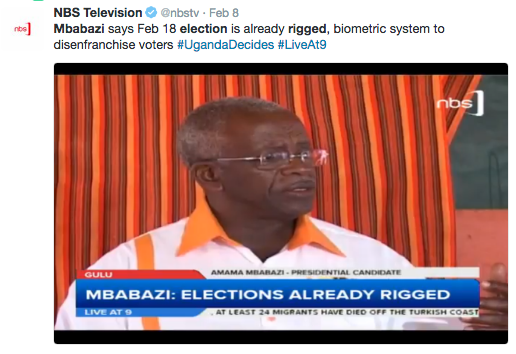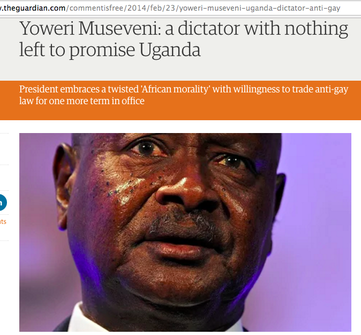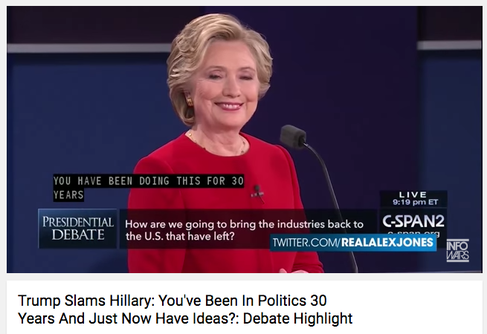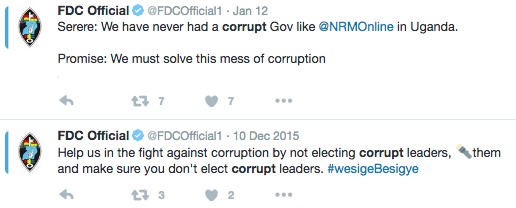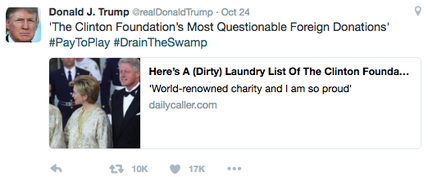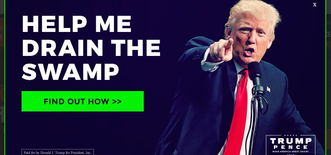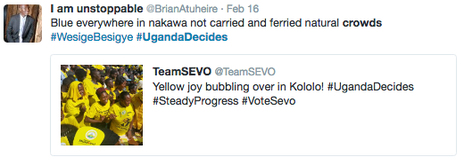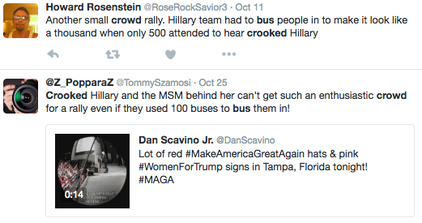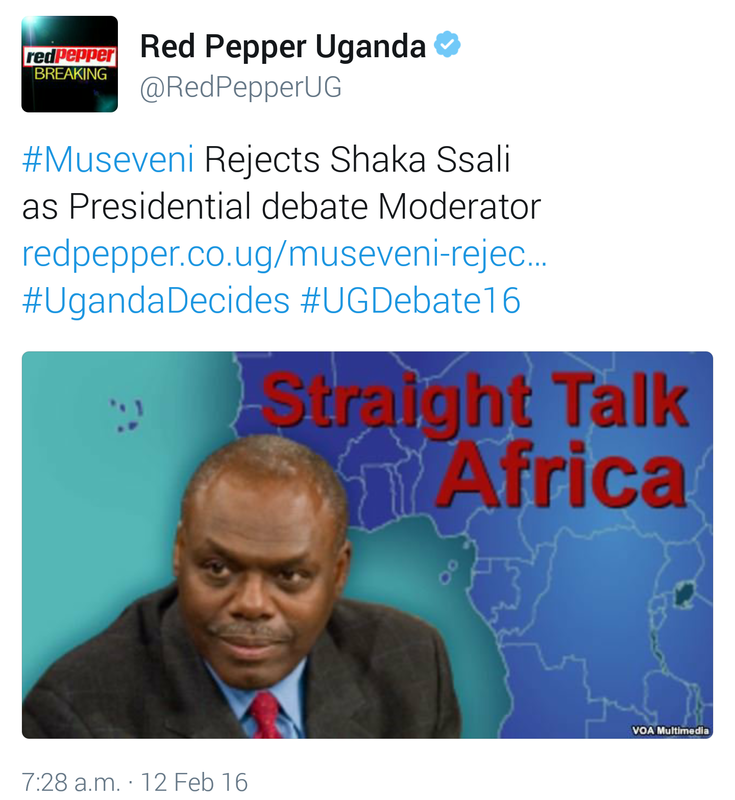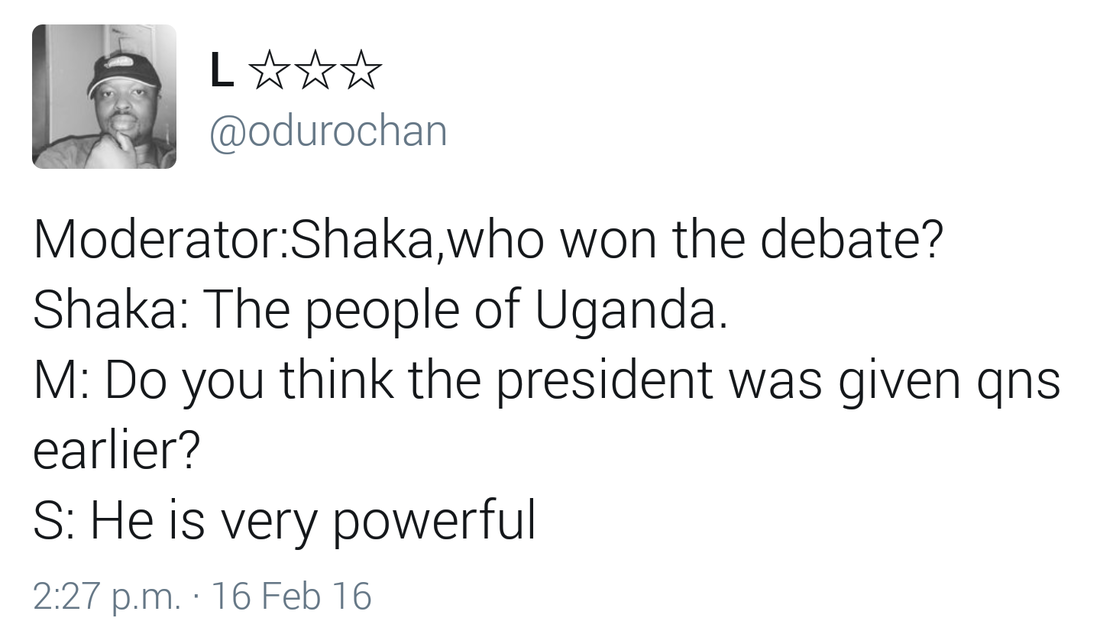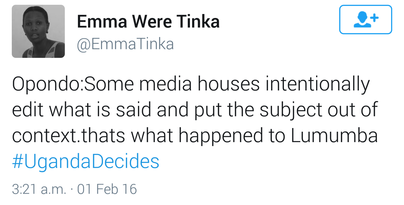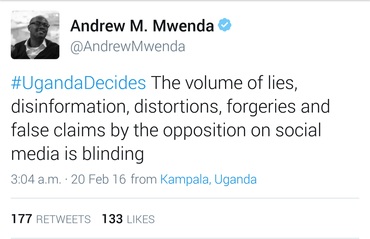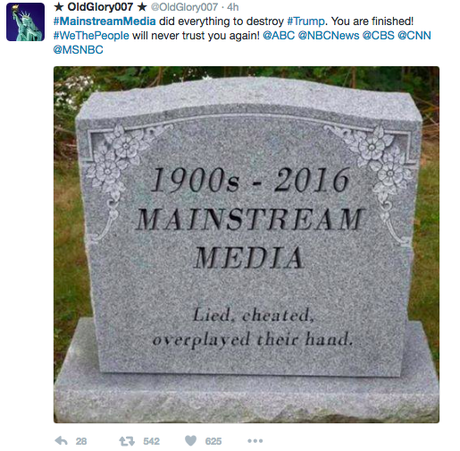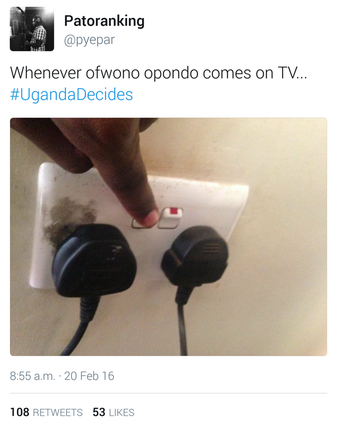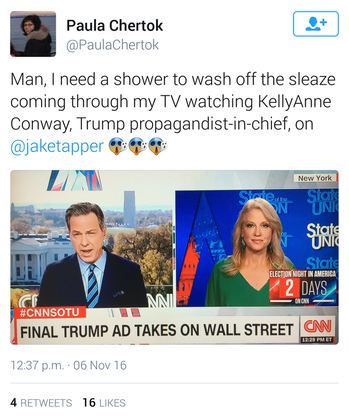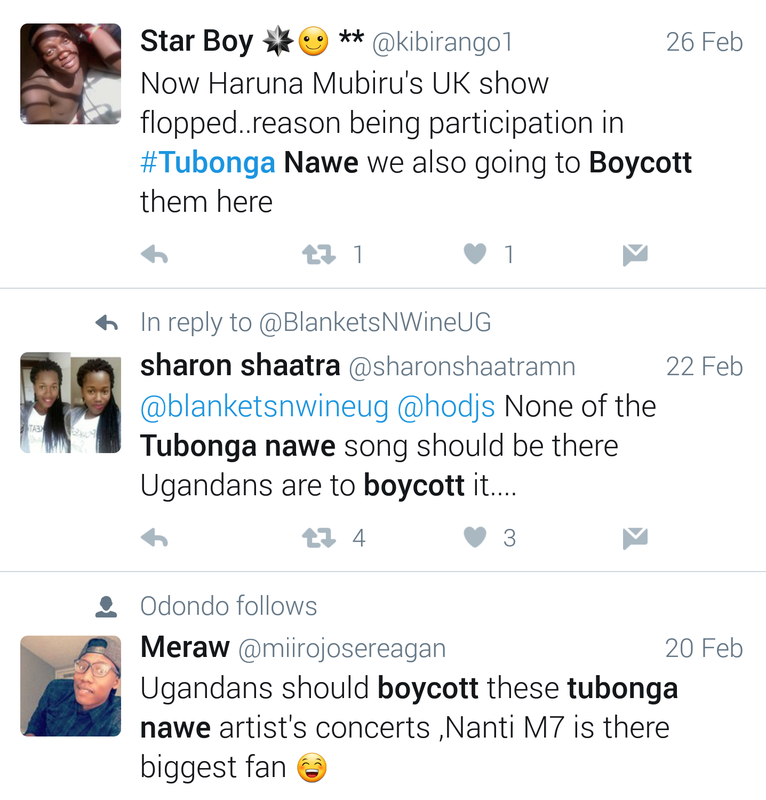I began 2016 as an ignorant Canadian abroad, and spent the whole year with my face pressed up against two foreign elections. I worked in Kampala through Uganda’s latest presidential campaign, and then travelled to Canada and the USA (Michigan, Pennsylvania and New York) in the final months of the American campaign. Despite the vast differences between these two countries and their politics, I couldn't help but notice many parallels between the two elections. A lot of people might think it’s crazy to compare an American election to a Ugandan one, but this was a pretty crazy election year, so please allow this humble traveler to throw a few thoughts together and make what you will of it.
1. Allegations of Rigging
I first started relating the American election to Uganda's when I heard Donald Trump claim that the American election would be rigged by the incumbent Democrats. Similar claims were made by President Museveni’s opponents leading up to the Ugandan election. In both cases, the ruling party reacted to claims of election rigging by warning that such talk is irresponsible and could cause chaos.
1. Allegations of Rigging
I first started relating the American election to Uganda's when I heard Donald Trump claim that the American election would be rigged by the incumbent Democrats. Similar claims were made by President Museveni’s opponents leading up to the Ugandan election. In both cases, the ruling party reacted to claims of election rigging by warning that such talk is irresponsible and could cause chaos.
2. Thirty Years
Hillary Clinton often touted her “thirty years” of public service experience, which happens to be exactly how much experience Yoweri Museveni has had as President of Uganda. (Incidentally, I was also born 30 years ago, so clearly 1986 came back around in a big way in 2016!) Opposition supporters often jabbed at Secretary Clinton’s and President Museveni’s 30 years experience as a bad thing, like: “if you couldn’t get it done in 30 years, then will you make good use of more time?”
3. Populist Politics
Both Trump and Besigye accused their ruling party opponents (incumbent Democrats and NRM respectively) of being corrupt, elitist and only out for themselves, while appealing to populist ideals of returning the power to the people. It feels a little strange to compare Donald Trump to Kizza Besigye and Hillary Clinton to President Museveni, but the incumbent-opposition dynamics brought out similar strategies in both elections. Those seeking power would claim that those already in power are misusing it, and are not properly serving the majority of voters, particularly the marginalized and oppressed. Interestingly, both populist candidates – Trump and Besigye – are actually wealthy businessmen, themselves members of the privileged upper class that they so often criticize.
4. Social Divisions
As is probably inevitable in any election, the campaigns created a divisive environment in both countries this year. Candidates and their supporters blamed and insulted their opposition. Communities became divided on ethic and class lines. Opposition supporters openly expressed anger at the ruling class, while those in favour of the status quo became disdainful of people wanting change, with Clinton calling Trump supporters “deplorables.” In Uganda, Western tribes and Rwandans became targets of opposition supporters. In America, women, non-caucasian citizens and immigrants suffered a backlash when Trump stirred up the frustrations of a slumping middle class and white men feeling the erosion of their privilege. Interestingly, Ugandan NGOs campaigned for the people to remain peaceful through all this strife (#iPledgePeace & #iChoosePeace) while Americans just focused on getting out the vote.
5. Crowd Competition
Ugandans often equate a successful event with the large crowd it attracts, and the Ugandan campaign was full of politicians and their supporters bragging that their rally crowds were bigger. I laughed the first time I saw Donald Trump bragging about the size of his crowd, after learning in Uganda that rallies don’t necessarily translate into votes. Some people may not even be supporters and just show up to enjoy the spectacle. Nevertheless, in both countries, the size of the crowd mattered to voters. Competition among supporters led to allegations that the incumbent candidate was bussing crowds in, while the opposition drew larger and more apparently passionate crowds, which furthered the narrative of corrupt vs. populist.
As is probably inevitable in any election, the campaigns created a divisive environment in both countries this year. Candidates and their supporters blamed and insulted their opposition. Communities became divided on ethic and class lines. Opposition supporters openly expressed anger at the ruling class, while those in favour of the status quo became disdainful of people wanting change, with Clinton calling Trump supporters “deplorables.” In Uganda, Western tribes and Rwandans became targets of opposition supporters. In America, women, non-caucasian citizens and immigrants suffered a backlash when Trump stirred up the frustrations of a slumping middle class and white men feeling the erosion of their privilege. Interestingly, Ugandan NGOs campaigned for the people to remain peaceful through all this strife (#iPledgePeace & #iChoosePeace) while Americans just focused on getting out the vote.
5. Crowd Competition
Ugandans often equate a successful event with the large crowd it attracts, and the Ugandan campaign was full of politicians and their supporters bragging that their rally crowds were bigger. I laughed the first time I saw Donald Trump bragging about the size of his crowd, after learning in Uganda that rallies don’t necessarily translate into votes. Some people may not even be supporters and just show up to enjoy the spectacle. Nevertheless, in both countries, the size of the crowd mattered to voters. Competition among supporters led to allegations that the incumbent candidate was bussing crowds in, while the opposition drew larger and more apparently passionate crowds, which furthered the narrative of corrupt vs. populist.
6. Debate Drama
Uganda held its first ever live televised Presidential debates in 2016, and they were full of backstage drama. The President chose not to participate in the first debate, with some speculating that he was avoiding a game that would be rigged against him. When President Museveni showed up to the second debate, some reported that he had too much control over the moderators and was given the questions in advance. Trump and his supporters also claimed that the debates were rigged against him, though he showed up anyway. Wikileaks later released an email indicating that Clinton was provided questions in advance.
Uganda held its first ever live televised Presidential debates in 2016, and they were full of backstage drama. The President chose not to participate in the first debate, with some speculating that he was avoiding a game that would be rigged against him. When President Museveni showed up to the second debate, some reported that he had too much control over the moderators and was given the questions in advance. Trump and his supporters also claimed that the debates were rigged against him, though he showed up anyway. Wikileaks later released an email indicating that Clinton was provided questions in advance.
7. Media Lost Credibility
Americans and Ugandans became more cynical of mainstream media in this past election year, with social media having more impact than ever on the public discourse. In the USA, Trump supporters started calling CNN “Clinton News Network,” no longer trusting the network’s objectivity, similarly to how Ugandans recognized bias in their own electoral media coverage. As a result, many people turned to social media for their information, which meant that we were all barraged with information we couldn’t trust. Uganda dealt with this problem by shutting off social media on Election Day. The internet stayed on in the USA.
8. Hated Spokespeople
Ugandans and Americans both tired of political spokespeople, “surrogates” and “bots” this year. Many just loved to despise figures like Kellyanne Conway (Trump’s ubiquitous campaign manager) and Ofwono Opondo (Executive Director of the Uganda Media Centre, who supported President Museveni). They became laughing stocks on social media for parroting messages that many people just couldn’t believe. (Spoiler alert: Conway and Opondo ended up laughing last.)
9. Celebrity Endorsements
In both the American and Ugandan elections, nearly all the most famous celebrities aligned themselves with the incumbent candidate. Beyoncé and Jay Z held a concert for Hillary Clinton, while Juliana Kanyomozi and Bebe Cool led an all-star group in praising President Museveni with Tubonga Nawe. In both cases, supporters of the populist opponent vowed to boycott the celebrities who supported the ruling party.
10. Privacy Is Over
Before this election season, I thought that hacking pretty much only happened in movies. Then in late 2015, news broke in Uganda about Fungua Macho, a spyware system that the government had purchased to access private communications between opposition elements. In 2016, Wikileaks published thousands of emails between Clinton’s team for the world to read and interpret as they wished. Privacy walls were publicly demolished, serving as a wake up call to anyone dabbling in politics: dance like nobody’s watching, but write like it could be read aloud in court on live TV and then shared on social media for the whole world to make memes out of.
11. Social Progressives Lose
“This is painful, and it will be for a long time,” said Hillary Clinton in her concession speech to Donald Trump. “We have seen that our nation is more deeply divided than we thought.” Mainstream media pundits and social media timelines misled me to believe the results would be different. In both countries, the guy who many smart people mocked all the way through the campaign actually won, swept in by a huge population of mostly rural and less educated voters who have a totally different view of politics from the big city commentators. Uganda was less shocked by the results than America, but both elections broke a lot of hearts.
The main difference between these two elections is that the USA voted decisively for “yuge” change, while many believe that Uganda’s election was stolen by its ruling party. EU election observers reported that the Ugandan election was not free or fair, with widespread reports of malpractices. Despite Trump supporters stoking the suspicion of a rigged election up until the polls closed, no one claimed that Trump stole his win (update: though now people are talking about the popular vote, voter suppression, Comey and the Russians). Besigye declared a parallel parliament, while Clinton graciously conceded, and her supporters were forced to reflect on why Trump won. This is democracy. Now is the time for celebration and mourning, acceptance and reconciliation. The drama is not over though, because a reality TV star is President Elect of the United States of America, and it’s anybody’s guess what’s next.

